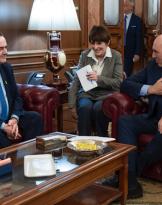Echoes of the Great War yesterday, 18 April, in the Teatro dell'Opera of the Casino of Sanremo where, in the context of the usual "Literary Tuesday", a conference was held to commemorate that tragic period of our national history deepening, among other topics, the commitment of the Italian Army.
Faced with a vast audience, prof. Pierpaolo Rivello, military attorney general at the supreme court of cassation in Rome, summit of the Italian military judiciary, intervened as speakers. division general Massimo Panizzi, deputy commander of the Alpine Troops for the Territory in Bolzano; Professor Aldo Alessandro Mola, a distinguished historian, former collaborator of the historical offices of the Defense Staff and the Army General Staff. The Director General, Ing. Giancarlo Prestinoni, representing the mayor of Sanremo, Alberto Biancheri, the municipal councilor Giovanna Negro intervened and on behalf of the prefect, Dr. Silvana Tizzano, the deputy prefect vicar, dr. Massimo Gatto.
Large public participation, which saw the presence of the main institutional authorities, the Weapon Associations and citizens.
Interacting with each other, the speakers were able to offer a broad overview of the most important aspects of the Great War. Professor Rivello, in particular, illustrated the organization and functioning of Military Justice during the conflict.
"The centenary of the Great War, said the Military Attorney, can be a truly propitious opportunity, which cannot be wasted, to shed light on a page without a doubt tragic, that of the Military Tribunals, often used as a deterrent to keep the troops cohesive". One of the most disturbing aspects concerned, between the 1914 and the 1918, the internal repression for the maintenance of discipline among the soldiers, through summary executions, extraordinary tribunals, repressive methods in general with which they wanted to keep the faith in victory high in the soldier.
"Deepening this chapter with serenity and objectivity is a must, also to reintegrate into the national memory that painful page of our history", Concluded Rivello that, in his intense activity as a lecturer and researcher, when he was Turin's military prosecutor, he conducted investigations into the war crimes of the Second World War, which remained unpunished until then.
The difficult relations between successive governments during the war and the Supreme Command were at the center of Professor Mola's intervention. Often difficult and thorny relationships, especially with General Cadorna.
On the other hand, continued Mola, "the extraordinary nature of that conflict - not even remotely comparable to those of the Risorgimento and the first colonial enterprises - could well explain the misunderstandings and the real clashes between politics and military leaders, in a context which saw the entire nation involved in the war effort, with more than 5 million mobilized and the participation of the same women, such as Red Cross nurses, journalists at the front, workers in the war production of industries and peasants. "
 Reconnecting to the scholar's considerations, General Panizzi then illustrated the meaning of the traveling exhibition entitled "The Great War. Faith and Value ", conceived and proposed several times by the Army General Staff to commemorate those events. "The Italian Army - said Panizzi - it really became the Army of the Italians, which they identified in it".
Reconnecting to the scholar's considerations, General Panizzi then illustrated the meaning of the traveling exhibition entitled "The Great War. Faith and Value ", conceived and proposed several times by the Army General Staff to commemorate those events. "The Italian Army - said Panizzi - it really became the Army of the Italians, which they identified in it".
In retracing the salient phases of what is remembered as the first "global" conflict, the general investigated the role of the Army, the life of the soldier and the hopes of the combatants, not only linked to the desire to survive and to return to embrace the affected, but also, genuinely, that of being able to contribute to the construction of a better nation. Panizzi concluded his speech with a reflection on the meaning and importance of memory, of the memory of what happened. "Peace is not a matter of course. Preserving it and defending it can have a very high cost". Hence the duty to remember those who fought, suffered and lost their lives to defend the freedom we all enjoy today. "Love for the Fatherland, said General Panizzi, we learn, above all, by re-appropriating our history, reading, studying, reflecting".
After the moderator's closure, Marzia Taruffi, head of the Press and Culture Office of the Casino of Sanremo, the public was able to listen to the songs of the "Compagnia Sacco" Choir of Ceriana who, performing the songs of the Great War, left in all a shadow of emotion.
Once again the Sanremo Casino has been able to show what an important role it continues to play for the Sanremo company, for which it represents a fundamental cultural center of reference and aggregation, managing to promote and carry out important initiatives.
Next year will be the centenary of the Battle of Vittorio Veneto and the end of the conflict: an event that the Casino is preparing to celebrate, honoring its history and that of the Sanremesi and Italians who, by participating in that epic, have given us a Best homeland.












